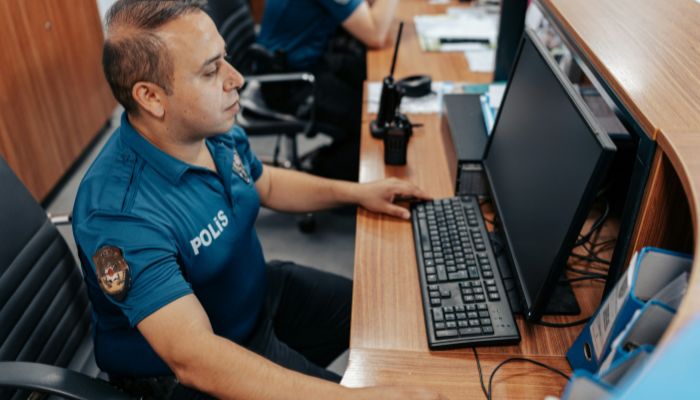
When a phone is powered off, tracking its IMEI number becomes significantly more challenging for police and service providers. Law enforcement relies on the phone’s active connection to a network to trace its IMEI, usually through cell tower signals or GPS. When the device is off, these signals are not transmitted, making real-time tracking nearly impossible.
However, the last known location before shutdown can provide a starting point for investigations. Service providers play a crucial role in disabling the device and aiding recovery. For a deeper understanding of the nuances and legal considerations involved, further information is available.
Understanding IMEI Numbers
An IMEI (International Mobile Equipment Identity) number is a unique identifier assigned to every mobile device, serving as a digital fingerprint that distinguishes one device from another. This 15-digit number plays a crucial role in the realm of device security, enabling various functionalities that enhance the overall safety and operational integrity of mobile phones.
The process of IMEI identification is fundamental for tracking capabilities. Each IMEI number is unique, making it possible to trace a specific device’s activity and location. This identification process is integral for maintaining high location accuracy, which is essential in both consumer applications and law enforcement regulations.
In terms of device security, the IMEI number allows network operators to block stolen or lost devices, preventing unauthorized use. This blocking mechanism ensures that even if a device is taken, it cannot be easily reactivated or used on other networks. The precision of IMEI identification further enhances these security measures.
Moreover, the unique IMEI number is indispensable for law enforcement regulations. It aids authorities in tracking devices involved in criminal activities, ensuring that the tracking capabilities are utilized to maintain public safety. By leveraging the IMEI number, law enforcement can achieve precise location accuracy, facilitating the efficient resolution of criminal cases.
How Law Enforcement Tracks Phones?

Understanding how law enforcement tracks phones builds upon the foundational role that IMEI numbers play in device identification and security. Law enforcement agencies utilize various surveillance methods to track mobile devices, primarily for criminal investigations and emergency response scenarios. Find out more about tracking stolen phones with IMEI number.
Location tracking is a critical technique, often involving triangulation of cell tower signals to pinpoint a device’s whereabouts. This method leverages the phone’s constant communication with nearby cell towers, even when not actively in use.
In addition to location tracking, law enforcement can perform data retrieval from service providers. This data encompasses call logs, text messages, and internet activity, which can be instrumental during criminal investigations. Advanced surveillance methods also include the use of stingrays, or cell-site simulators, which mimic cell towers to intercept communications and identify device locations.
For emergency response, tracking phones becomes a vital tool in locating individuals in distress. Emergency services can request real-time location data from carriers to expedite rescue operations. Overall, the combination of IMEI numbers, location tracking, and sophisticated surveillance methods ensures that law enforcement can effectively monitor and respond to various situations, enhancing public safety and aiding in the swift resolution of criminal activities.
Tracing Phones: On Versus Off
When it comes to tracing phones, the device’s power state significantly impacts the tracking methods available to law enforcement. A powered-on phone provides extensive tracking capabilities, leveraging GPS, Wi-Fi networks, and cell towers to deliver precise location accuracy. These methods enable authorities to pinpoint a device’s location in real-time, which is especially crucial during emergency procedures.
However, the scenario changes drastically when a phone is turned off. Tracking capabilities diminish, as the device no longer communicates with cell towers or transmits signals that can be intercepted. This state, often referred to as “off grid tracking,” poses significant challenges. Law enforcement agencies face technology limitations, as conventional tracking methods become ineffective.
Despite these limitations, certain techniques can still offer limited insights. For example, the last known location of a phone before it was powered off can be used as a starting point in investigations.
Additionally, some advanced tracking systems may utilize residual signals or leverage data from the phone’s intermittent “check-ins” before it was turned off. Nevertheless, the effectiveness of these methods is constrained, making the power state of a phone a critical factor in the success of tracking efforts.
Legal Aspects of IMEI Tracking

While the technical limitations of tracking a powered-off phone highlight significant challenges, the legal framework governing IMEI tracking adds another layer of complexity. Law enforcement agencies must navigate a myriad of laws and regulations when attempting to track a device through its IMEI number. The legality of IMEI tracking hinges on obtaining proper authorization, often necessitating a warrant issued by a court. This requirement aims to balance investigative needs with privacy implications.
Regulations surrounding IMEI tracking vary widely across jurisdictions, making it imperative for law enforcement to stay informed of local and international laws. In some regions, stringent privacy laws impose significant limitations on the ability to track devices, necessitating clear and compelling justification for any tracking efforts.
Moreover, the enforcement of IMEI-related laws is often complicated by the rapid evolution of technology and communication methods. Law enforcement must continuously adapt to these changes to ensure compliance with legal standards while effectively carrying out their duties. Understanding the legal landscape is crucial for the lawful and ethical use of IMEI tracking. Ensuring that privacy rights are respected even as authorities work to enforce the law.
Privacy Concerns and Safeguards
Balancing security and privacy is a fundamental concern in the realm of IMEI tracking. While IMEI tracking can aid law enforcement in recovering stolen devices and combating crime, it also raises significant privacy implications. The ability to track a device through its IMEI number, even when the phone is off, necessitates stringent data security measures to protect user rights.
Three key considerations in addressing privacy concerns and safeguards are:
- Government Oversight: Proper checks and balances are essential to ensure that IMEI tracking is used responsibly. Government oversight can help prevent misuse and ensure that tracking is only employed in legally sanctioned scenarios.
- Technology Limitations: Understanding the limitations of IMEI tracking technology is crucial. While it can be a powerful tool, it is not infallible and should be used in conjunction with other investigative methods to avoid over-reliance on potentially flawed data.
- User Rights: Clear policies and regulations must be established to inform users about their rights regarding IMEI tracking. Transparency in how data is collected, stored, and used is vital to maintaining public trust and protecting individual privacy.
Steps to Protect Your IMEI

Protecting your IMEI is crucial to safeguarding your device from unauthorized tracking and potential misuse.
To enhance IMEI security, start by recording your device’s IMEI number and storing it in a secure location. This ensures you have quick access to it in case of loss or theft.
Next, consider using a PIN, password, or biometric lock to prevent unauthorized access to your phone. This adds an extra layer of IMEI protection, as it restricts physical access to your device. Regularly update your device’s software to benefit from the latest security patches that can protect against vulnerabilities.
For enhanced IMEI privacy, avoid sharing your IMEI number publicly or with untrusted sources. Be cautious of phishing attempts and scams that might request your IMEI information under false pretenses.
To monitor IMEI tracking, utilize services that allow you to check if your IMEI number is listed as stolen or blacklisted. This can provide an early warning if your IMEI has been compromised.
Lastly, report any loss or theft immediately to your service provider and law enforcement. Prompt reporting maximizes IMEI safety and aids in the recovery or disabling of your device, protecting your personal information and preventing misuse.
Conclusion
While IMEI numbers are crucial for identifying mobile devices, tracking a phone with the device turned off presents significant challenges for law enforcement. Legal frameworks and privacy concerns further complicate the process. Understanding the mechanisms of IMEI tracking and the limitations involved is essential. To safeguard privacy, individuals should take proactive measures to protect their IMEI numbers. Overall, the balance between security, legal considerations, and personal privacy remains a complex and evolving issue.